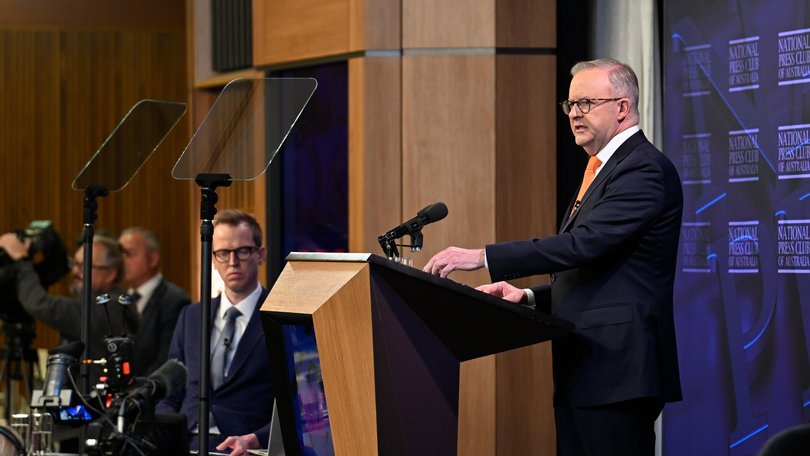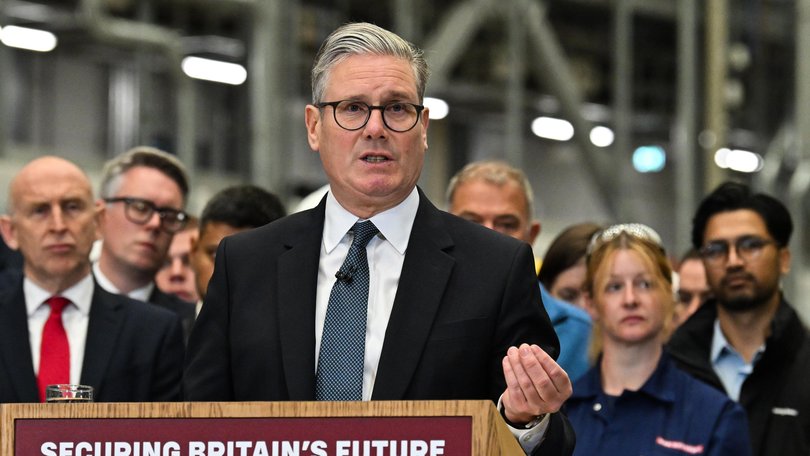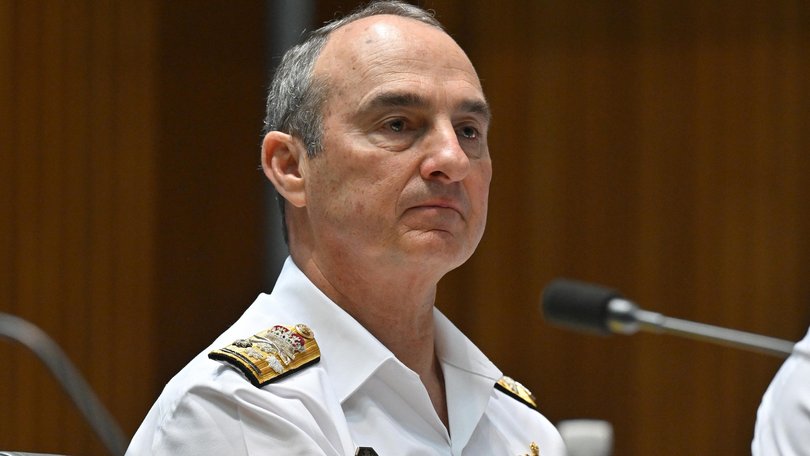NICOLA SMITH: Is Anthony Albanese ignoring the warning siren on defence budget ahead of G7 Summit?
NICOLA SMITH: The Prime Minister may find himself out of step with his peers at the G7 Summit.

In his half hour address to the National Press Club setting out his political vision for the coming term, Prime Minister Anthony Albanese largely ignored the warning siren that everyone else is talking about.
National defence, a topic on the tip of the tongue of every leader of the democratic world, only received one cursory mention in a ten-page, 3300-word speech that swept through the details of Labor’s three-year agenda from housing to health and energy.
“Australians voted to strengthen our defence capability and strengthen our relationships in our region,” Mr Albanese said briefly, before moving straight on to education.
Sign up to The Nightly's newsletters.
Get the first look at the digital newspaper, curated daily stories and breaking headlines delivered to your inbox.
By continuing you agree to our Terms and Privacy Policy.The Prime Minister and Defence Minister Richard Marles in the past have not shied from warning Australia faces the most dangerous strategic environment since World War 2, which makes it all the more surprising that defence and deterrence barely got a nod in a long list of new term priorities.
In skirting round the topic in his televised address to the nation, Mr Albanese may find himself out of step with his peers at the G7 Summit this weekend, who have been pledging not only to accelerate defence spending but also intent on raising public awareness and readiness to deal with rising threats.

He will cross paths with British Prime Minister Keir Starmer, who in early June did not mince his words about the new national security reality where “every part of society, every citizen of this country” has a role to play.
“We have to recognise that things have changed. In the world of today, the front line, if you like, is here. The threat we now face is more serious, more immediate and more unpredictable than at any time since the Cold War,” he said while announcing a new strategic defence review.
Canadian Prime Minister Mark Carney, host of the G7, was the latest in a growing line of leaders to promise to boost national defence spending to its highest level in decades, in a speech at Toronto university on Monday that warned Canada must reduce its reliance on the US.
Mr Albanese will also be rubbing shoulders with Japanese Prime Minister Shigeru Ishiba, who is currently facing a show of force from China after two Chinese aircraft carriers for the first time ventured into the easternmost edge of Japan’s exclusive economic zone.

Tuesday’s speech was clearly intended to be wide-ranging overview of next term policies, but in the question and answer session that followed, four out of 15 questions focussed on defence and national security, indicating the hunger for more information in uncertain times.
Asked whether he accepted the global trend to accelerate defence funding in a challenging strategic environment and whether he was open to lifting Australia’s defence budget ambitions, Mr Albanese pointed to a $57 billion investment over ten years.
Since US Defence Secretary Pete Hegseth floated Washington’s demand for Australia to hike its defence budget to 3.5 per cent of GDP, far beyond the projected 2.3 per cent by 2033, Mr Albanese has repeatedly insisted the Government will act in the national interest.
He has made the reasonable argument that spending should be guided by actual capability needs, not random percentages.
“Arbitrary figures, you know, lead to a cul-de-sac. And we want to make sure as well that every single dollar that Defence spends results in actual assets,” Mr Albanese said on Tuesday.
“It seems to me that if the Health Minister or the Comms Minister or the Infrastructure Minister came to us and said, ‘we want you to spend X percentage of GDP but we won’t tell you what it’s for,’ that — they wouldn’t get far in an ERC process.”
The Prime Minister also made the salient point that national security is also about investing in regional relationships including Indonesia, Papua New Guinea and other Pacific Island nations — a strategy where Labor has already made several inroads.
The Government’s reluctance to commit to a higher percentage of defence investment contrasts sharply with calls from security chiefs like NATO boss Mark Rutte who has set out a plan for NATO members to spend 5 per cent of GDP on defence.
If political leaders continued to subsidise health and pension systems at the expense of protecting their societies, they had “better learn to speak Russian,” Mr Rutte warned somewhat starkly in a speech that also flagged China’s increasing collaboration with Russia, as well as Iran and North Korea.
But he made another key argument that national defence does not just come down to simply ramping up the budget.
Addressing the question of whether the brutal facts might “rattle our populations”, he responded, “yes, they better be rattled because this is the reality”.
“Our task as politicians is to be brutally honest about how we see the facts,” said Mr Rutte.
It’s on this point that the Albanese government has shown itself to be risk averse in having a hard and frank conversation with the public about the nature of the rising threats in the region and how best to prepare.
Chief of the Defence Force Admiral David Johnston raised the issue eloquently last week at a conference on preparedness and resilience hosted by the Australian Strategic Policy Institute, stressing clear communication with the public not to alarm but to project confidence.

“We talk freely during the lead up to the summer period of all homes should have a bush fire survival approach,” said Admiral Johnston.
“National security is very similar to that, and it’s a responsibility that we have to make sure that understanding of the environment is there, the risks that are emerging and changing in it, and how we as a nation are responding to it,” he said
In this respect, Mr Albanese’s press club appearance on Tuesday was a missed opportunity to add substance to that national conversation rather than fall back on safe and well-worn talking points.

